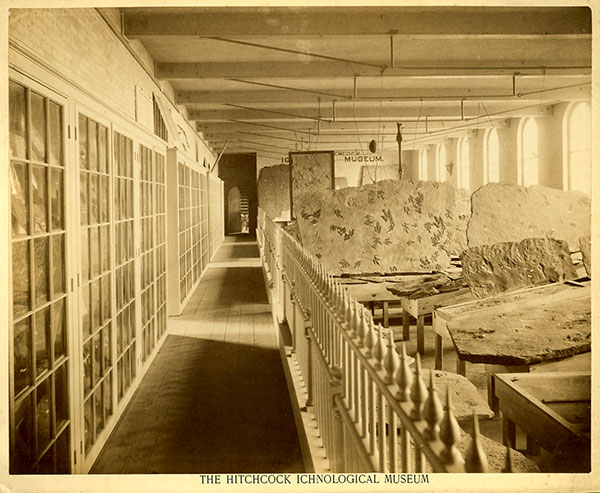In Brief
Woods Cabinet

Image courtesy of Buildings and Grounds Collection, Archives and Special Collections, Amherst College.
Woods Cabinet was housed in the Octagon building, constructed in 1847-1848. When Edward Hitchcock became president of the college in 1845, enrollments had fallen to the point that at least one trustee wondered whether the college should admit defeat and downgrade itself to an academy. Unable to raise funds to build a hall for the study of the sciences, Hitchcock became so discouraged that he resolved never to ask for money again.
Josiah B. Woods was so impressed by the sacrifices Hitchcock and the faculty were making, and by the quality of their work, that he personally approached potential donors, such as Abbott Lawrence, to see if he could raise the funds. When the men proved reluctant, Woods told them that no less a person than Sir Charles Lyell had said that Hitchcock was more knowledgeable about geology than anyone else he had met on this side of the Atlantic. Surely such a man should have their support! Reluctantly, Hitchcock allowed himself to be taken to meet these men. Duly impressed, they made their donations and helped to shepherd a successful petition for a grant to the college through the Massachusetts Legislature.
In an 1898 paper published in Popular Astronomy, David Todd, then professor of astronomy at Amherst College, suggested there may have been other reasons for the generous response. In the 1840s, there were fewer than five astronomical observatories in the whole of the United States. In 1843, another "great comet" crossed the sky. In 1846, the planet Neptune was discovered. If Massachusetts wanted to be at the forefront of American science, now was the time to invest, and the Octagon included an observatory.
When the building was dedicated in 1847, a letter from the Honorable David Sears was read aloud at the ceremony. It was Sears who had so discouraged Hitchcock the previous year when he asked for a donation, but his attitude had changed:
"While the benefactors of the college are thus honored, the faculty of the college should come in for their share of gratitude. I have been a silent, but not inattentive observer of them. I have been informed of their devotion to their literary labors, of their self-denials, of their voluntary surrender of a part of their moderate salaries, reserving only enough for a bare subsistence, to relieve the college in its necessity. Such disinterested zeal stands out brightly, and merits an honorable record."
The ever-loyal Benjamin Silliman gave a speech, too, once again showing his support for and pride in the achievements of the man who had sent him a box of minerals thirty years previously.